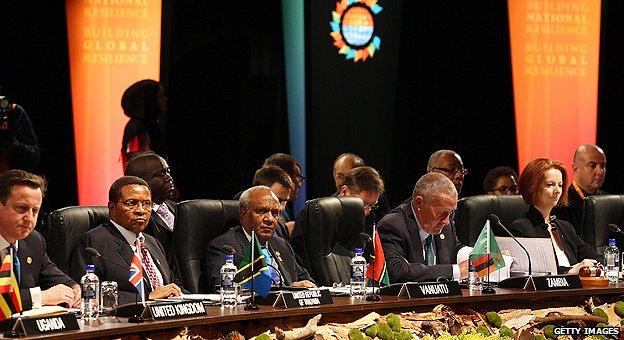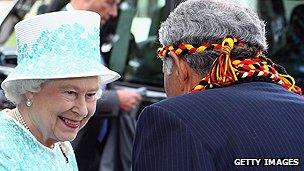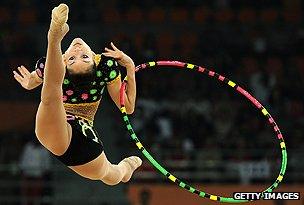Profile: Commonwealth of Nations
- Published

Commonwealth members attend a heads of government meeting in Australia in 2011
Formerly known as the British Commonwealth, the Commonwealth of Nations is a loose association of former British colonies and current dependencies, along with some countries that have no historical ties to Britain.
The modern Commonwealth has its roots in the Imperial Conferences of the late 19th and early 20th centuries, when some of the colonies within the British Empire began to acquire greater autonomy.
As some achieved self-government and varying degrees of independence from Britain, a new constitutional definition of their relationship with one another had to be found.
It was only after the independence of India and Pakistan in 1947 that the Commonwealth acquired its modern shape. It dropped the word British from its name, the allegiance to the crown from its statute, and became an association for decolonised nations. The British monarch, however, remained the official head of the Commonwealth.
The Commonwealth had no constitution until it adopted its Charter in 2012, which commits members to 16 core values of democracy, gender equality, sustainable development and international peace and security.
Commonwealth Heads of Government Meetings (CHOGM) are held every two years to discuss issues of common interest.
In between the summits, the London-based Secretariat - the Commonwealth's executive arm - takes responsibility for carrying out programmes agreed upon during the various meetings. The Secretariat is headed by a secretary-general.
Leadership
Head: Her Majesty Queen Elizabeth II

Queen Elizabeth
As head of the Commonwealth, the Queen is recognised by its members as the "symbol of their free association".
The Queen attends Commonwealth summits and the Commonwealth Games, which are held every four years. Her advanced age means that she is no longer likely to attend on a regular basis if travel involves long distances, and may delegate the duty to her heir, Prince Charles.
On every Commonwealth Day, the second Monday in March, the Queen broadcasts a message to all member countries.
Secretary-general: Patricia Scotland
The secretary-general acts as the chief executive of the Commonwealth and is elected by heads of government from among Commonwealth diplomats and foreign ministers for a maximum of two four-year terms.
Issues and challenges
The Commonwealth has been criticised for being a post-colonial club. But to its members it is a voluntary association of independent states in the business of promoting democracy, good government, human rights and economic development.
It has also been criticised for having little influence. Indeed, the Commonwealth does not act as a bloc in international affairs and has little influence over non-members.

The Commonwealth Games are a major event for the association
However, its influence over its own members derives from the benefits which membership brings in developmental support and cooperation on international goals.
Unlike the United Nations, Commonwealth members have no contractual obligations, but members commit themselves to the statements of beliefs set out in the Charter.
In 1995 the Commonwealth set up a Commonwealth Ministerial Action Group (CMAG), comprising eight ministers, whose function is to deal with governments that persistently violate Commonwealth principles. It can take such punitive collective measures as imposing economic sanctions or suspending recalcitrant members.
However, the Commonwealth draws its main strength from its moral authority. Committed to racial equality and national sovereignty, it was the focus of the campaign against apartheid in the 1980s. In 1995 it suspended Nigeria's membership after the military regime there passed the death sentence on the writer Ken Saro-Wiwa and other activists, and in 2000 it suspended Fiji after the overthrow of the elected government.
Zimbabwe was suspended in March 2002, after elections which observers said were marred by violence and intimidation. In December 2003 the suspension was extended indefinitely. The Zimbabwean government responded by announcing the country was leaving the Commonwealth for good.
Pakistan was suspended twice during the military rule of President Pervez Musharraf.
In 2013 The Gambia announced its withdrawal from what it called a "neo-colonial institution".
Membership of the Commonwealth brings some practical benefits through the Commonwealth Fund for Technical Cooperation (CFTC). This is the main way in which the Commonwealth promotes economic and social development and the alleviation of poverty.